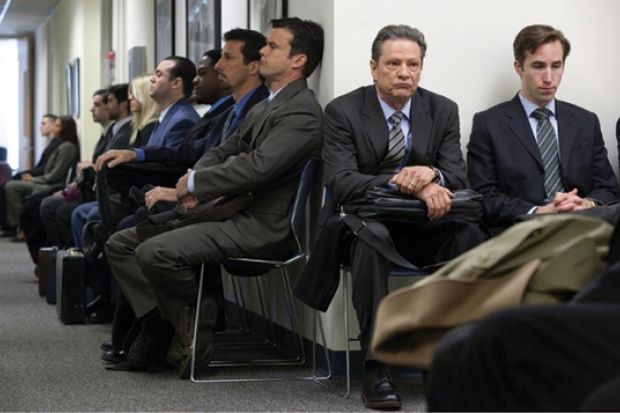The Company Men
Directed by John Wells
Starring Ben Affleck, Chris Cooper, Tommy Lee Jones and Kevin Costner
Released in the UK on 11 March
What happened? Someone die?" jokes Ben Affleck's character, Bobby Walker, a few moments before being fired. John Wells' new film, The Company Men, explores a subject no one wants to know about: what it's like for a high-flying executive to be made redundant in the 21st century. Indeed, some of those who have seen it in the US have said how hard it is to empathise with Wells' characters. They have a point. I mean, Walker has to sell the Porsche, resign from the golf club, get rid of his detached house and accept his brother-in-law's offer of a job as a building labourer. Too bad, huh?
Except that in focusing on executive layoffs, Wells has found a subject of particular relevance to the moment, for the phenomenon is one that has spread across the business world since "downsizing" was redefined after the crash of 2008 to put everyone in the firing line. More importantly, the film as a whole is concerned with the increasingly conditional nature of employment across social classes; there are hints that Walker's brother-in-law may soon be out of work as well.
The Company Men follows the fortunes of three executives - Walker, Gene McClary (Tommy Lee Jones) and Phil Woodward (Chris Cooper) - after they are fired from the same company as it struggles to raise its share price in an adverse market. As the company's chief observes, "We work for stockholders now." None copes well with redundancy. Walker goes only once to a life-coaching class in which he is forced to chant with the other inmates, sorry, students: "I will win. Why? Because I have Faith, Courage, Enthusiasm." The futility of such responses is one of the film's subjects - for it addresses the problem of denial, arguing that society blinds itself to the consequences of mid-life unemployment, while those affected refuse to acknowledge the effects on their families and themselves. It is almost a relief when, after months of struggle, Walker tells his wife, "I'm a 37-year-old unemployed loser who can't support his family."
This is a brave film not just because executive unemployment is one of the last things most of us are inclined to get excited about - it's almost impossible to imagine businessmen demonstrating in Whitehall surrounded by thousands of supporters - but because it is necessarily lacking in humour. For The Company Men is about the cost of living without security in the contemporary world: not funny, and not a subject that lends itself to entertainment. Nor, for that matter, do the issues of vastly inflated executive salaries, the death of manufacturing industries in the West, the bailout of the banks and the callousness of the monied classes - all of which the film engages in debate.
Why, then, should one see it? Because, despite being made for a mainstream audience, The Company Men makes other such films look like fantasies completely lacking in relevance to the real world. And it has an excellent cast. Affleck looks more persuasive each time I see him, and brings more depth to Walker than to any character he has previously played. Always worth watching, Jones endows McClary with the quiet, honest dignity of a man who worked his way up from the shop floor, while Cooper distinguishes himself in a role that provides the film with its emotional climax. Kevin Costner is excellent as Walker's brother-in-law, underplaying his disinterested generosity of spirit; indeed, the film as a whole is dry, unsentimental and cool-headed. These skilled actors make a challenging drama more engaging than it would otherwise be, and a pleasure to watch.
It would be easy to dismiss The Company Men as worthy and self-righteous, although I don't see why, if concerned with injustice, a film should eschew such qualities. Any critique of society should contain an implicit vision of a fairer world. And it seems a small price to pay for the return of the state-of-the-nation drama to the silver screen, of which this is a welcome, if all too rare, example.
If it has a flaw, it is that of being a little too anxious to temper its message with hope - a predictable Hollywood tic. In its final minutes, it announces that the unemployed will find jobs - except, of course, for the millions it temporarily forgets about who live in parts of America where none exist. Whoops! A film so brave in other respects has no business losing its nerve at the last hurdle. If you can overlook that lapse, The Company Men is worth seeing for an honest examination of post-credit crunch America, its failure to admit the consequences and the despair that has ensued.
